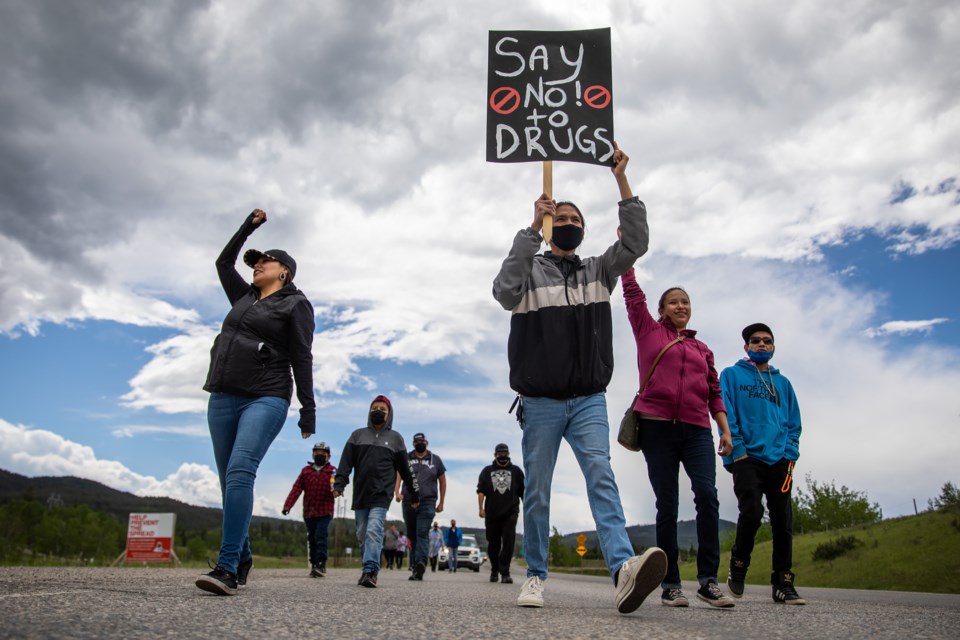MORLEY – A group wanting to boot drug dealers off the Stoney Nakoda First Nation is putting the heat on chiefs and councils to act ahead of its latest protest walk and grassroots petition.
This weekend in Morley, the Wácágâ ôkóná’gîcíyâ’bî group, meaning a shield that provides protection physically and spiritually in the Stoney language, is hosting the Battle Against Drugs Walk, a solidarity protest by those fed up with the deadly and adverse toll illegal drugs have taken on the reserve.
“We want a bylaw that will show drug dealers aren’t allowed on the reserve,” said organizer Summer Twoyoungmen. “Even though they’re band members, we don’t want them here dealing their drugs on the reserve.”
The walk starts at the Chiniki Gas Bar off Highway 1, Saturday (June 5). Everyone is welcome to join and asked to meet at 11:30 a.m. for opening prayer, which will be followed by the walk. From the gas bar, participants set out for approximately two kilometres to the Stoney Tribal Administration building parking lot in Morley for speeches and refreshments.
“I believe there are a lot of people out there in support of this, but they’re unaware of it because they’re not online and they don’t see what’s happening,” said Twoyoungmen. “The walk would be a good chance to get exposure.”
The Stoney Nakoda Nation has about 4,000 community members and is comprised of three bands – Wesley, Bearspaw, and Chiniki.
After being swept into the addict lifestyle, Twoyoungmen has been drug-free for two years, but she’s acutely aware of the hard drugs – namely methamphetamine and heroin – and its dealers who are severely hurting her community right now.
“I’m not around it as much as I was when I was in addiction, but whenever I am out I do see people that are walking on the reserve and some people look like they’re coming down from the drugs or they’re looking for drugs; they’re at the gas bar looking for money to get a quick fix; there are people walking around the townsite with no shoes," said Twoyoungmen.
To remember community members who’ve died because of drugs, there will be hand drummers and singers joining participants on the walk along Morley Road.
A main goal the group has is to remove drug dealers on the Nation. A petition for Stoney Nakoda residents with band numbers is circulating to rid the reserve of its pushers and will be available to sign at the walk.
Going door-to-door recently with the petition, Twoyoungmen said many Nation members are fed up with the “drug epidemic” and more than 400 people have signed the document that calls for bylaws to be put in place to banish drug dealers from the reserve for up to five years.
“They instantly kind of say, ‘OK, good. We understand the drug dealings are bad, we understand how much this is causing our people harm, and yes we sign the petition,’” said Twoyoungmen. “There has been one or two people that weren’t for it, but that was more for a political reason, I guess. The petition does not align with chief and council, it is basically kind of going against them because they haven’t been doing anything.”
The Outlook reached out to the Stoney Tribal Administration (STA) for comment on the walk and petition, but did not receive a response before publication deadline.
In a September 2020 interview with the Outlook, STA CEO Ryan Robb said: "Leadership has recognized and they are hearing this ... Behind the scenes, we are working on having the best information possible to have the best response possible."
Bylaws and permit-based systems have been utilized around other First Nations in Alberta to help get rid of drug dealers.
Joining Saturday's walk is the RCMP, and Cochrane Cpl. Troy Savinkoff said the selling and use of illegal drugs is the Mounties largest concern on the reserve.
The primary challenges the RCMP face are supply and demand.
“Over the years we’ve seen an unfortunate culture develop over there and the community and the leadership has as well,” said Savinkoff. “With the creation of the new Stoney Nakoda [RCMP] detachment out there, one of the first jobs we’ve gone about trying to accomplish is speaking to leadership and speaking to local residents to have a clear understanding of the magnitude of the issue out there and then start to institute different – not just enforcement, but also restore the justice and programs to try to combat this issue.”
–With files from Jenna Dulewich
Read more from RMOToday.com



